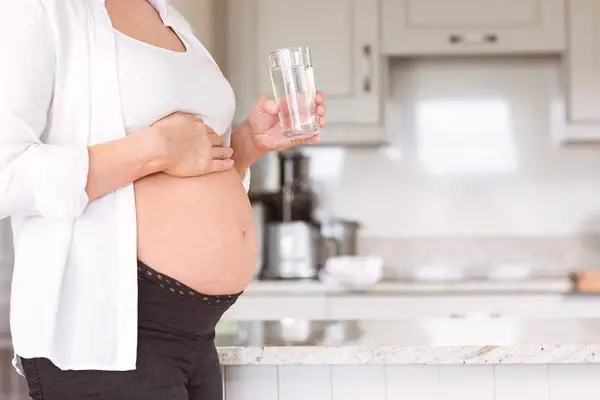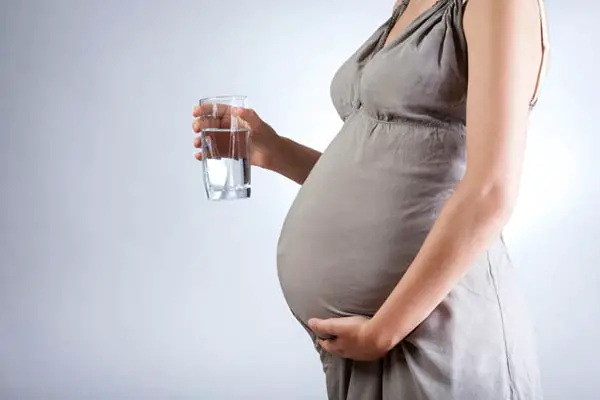
Of course, you already know that it is critical that you keep hydrated all the time anyway- but it is of increased importance when you are pregnant. In addition, you must make sure that the water you are drinking is safe.
Why Do You Need to Stay Hydrated?
You’ve probably been told most of your life that you should be drinking eight glasses of water per day, right? You may be wondering why it is so critical that you keep yourself hydrated.
Well, the truth is that your body is made up of 70 percent water and depends on water to survive. Each and every organ, tissue, and even cell in your body requires water in order to properly work.
In fact, your body uses water to maintain your body temperature, lubricate your joints, and even remove waste. Water is critical for your overall health.
How Do You Become Dehydrated?
Now that you know why water is so important, you’re probably wondering how your body loses water. When you sweat, go to the bathroom, and even when you breathe, you’re losing water.
When the weather is hot and you are physically active, you are also losing water. If you have a fever, you lose water because your body is struggling to maintain the proper temperature.
When you’re sick with diarrhea or vomiting (such as with morning sickness while pregnant), you’re also losing water. If you don’t make sure to replace that water, you can become dehydrated really quickly.
Signs and Symptoms of Dehydration
So, what are some signs of dehydration? If you notice any of the following signs or symptoms, you will know that you are dehydrated:
- Little/no urine or dark urine
- Extreme thirst
- Dry mouth
- Feeling dizzy/lightheaded
- Sleepiness/fatigue
- Confusion
- Headache
- No tears when crying
Of course, even when you’re not pregnant, you should never wait until you experience these signs and symptoms to take action. Instead, you should always be drinking enough water to be proactive and prevent yourself from getting to that point.

Who is at Risk for Becoming Dehydrated?
There are several things that increase your risk of becoming dehydrated, such as: exercising at a high intensity, specific medical conditions, sickness, and an inability to get enough fluids during the day.
In addition, older adults are at a greater risk for dehydration. As we age, our brains might not be able to discern when we are thirsty and send signals to our body to keep us from becoming dehydrated.
Therefore, you must increase the amount of water you are drinking if you:
- Have specific medical conditions such as a bladder/kidney infection or kidney stones
- Pregnant or breastfeeding
- Plan to be exercising
- Plan to be outdoors when it’s hot
- Have been sick with vomiting and/or diarrhea
- Have a fever
- Are on a diet/trying to lose weight
How much water should you be drinking every day?
Chances are that you have heard many different recommendations for the proper consumption of water over the years. In most cases, the rule is six to eight 8-ounce glasses of water each day.
This is a pretty reasonable goal. On the other hand, everyone is different and this may be too much or too little for you.
As a general rule, most people can stay hydrated by drinking water and other fluids when they feel the need too. Some people find that six glasses is exactly what they need and others find that they need more than eight. You have to take the time to listen to your body.
If you’re not sure if you’re getting enough water- you can find out by checking your urine. If you have colorless or light yellow urine, you are pretty well hydrated.
On the other hand, if your urine is dark yellow or even amber-colored, you are dehydrated and need to increase your water consumption.
Other Ways to Stay Hydrated
Many women complain that they don’t like water because it has “no flavor.” So, they often wonder if there’s any other way to stay hydrated. The truth is that water is the best way.
There are some other foods and drinks that can help, but many of them also bring with them sugar and extra calories.
Drinks such as juices, herbal teas, and milk are great for increasing your water intake. Even caffeinated drinks can contribute to your water intake.
However, when you’re pregnant, you must remember that you don’t need to be drinking much caffeine, but a moderate amount of caffeine is perfectly fine for most people.
A moderate amount is 200 to 300 milligrams or two to four 8-ounce cups of coffee- but you should cut down to no more than 2 cups when you are pregnant.
Keep in mind that caffeine can cause jitteriness or cause you to urinate more frequently- which, again, contributes to losing water that needs to be replaced somehow.
In addition, you can find water in fruits and veggies such as tomatoes, lettuce, and watermelon. You can also get water from soup broths- as well as necessary sodium (just make sure you don’t have too much!)

Are Sports and Energy Drinks Acceptable?
In most cases, plain water is all that you need for proper hydration. On the other hand, if you plan to exercise at a high intensity for a long period of time, a sports drink could help.
Keep in mind that high-intensity exercise is not recommended for women who are pregnant though. A sports drink will replenish your electrolytes and carbohydrates, which will increase your energy levels and help your body properly absorb the water.
Keep in mind that you must be selective when choosing a sports drink. Many times, they are very high in calories due to the added sugar and they are high in sodium.
Additionally, make sure that you pay attention to the serving size. A sports drink bottle may contain several servings, so when you drink a whole bottle, you may need to double or even triple the amounts on the nutrition label.
There are some sports drinks that contain caffeine, so be careful with these that they do not push you over your recommended daily limit.
You must keep in mind that an energy drink is not the same thing as a sports drink. In most cases, an energy drink has lots of caffeine and other stimulants such as taurine, ginseng, and guarana.
Your body- and your developing baby- does not need these things. In addition to these unnecessary chemicals, they are usually high in sugar.
Tips to Keep Yourself Hydrated
Here are a few tips that can be helpful in maintaining hydration throughout the day. Keep in mind that it is necessary to stay hydrated- even more so when you’re pregnant.
Keep a bottle of water with or near you at all times during the day. If you are constantly purchasing bottled water, it will get expensive- and you’re just creating more trash. Instead, purchase a reusable water bottle and fill it during the day.
If you simply can’t stand the taste of plain water, simply add a slice of lime or lemon to your drink. Another great additive is a cucumber. Do some research, you can find lots of different natural options for flavoring your water.
If you’re working out (carefully, if you’re pregnant), make sure that you drink plenty of water before, during, and even afterward.
If you start getting hungry, drink some water. Many times, we confuse thirst with hunger. If you are truly hungry, that feeling will not be satiated by drinking water.
Some research maintains that drinking water can help you lose weight (which- as you know- is not recommended during pregnancy, but a great idea for after you give birth!) because water helps you to feel full.
If you have difficulty remembering to drink water during the day, set a schedule for yourself. For example, start your day with a glass of water (which is great because it jumpstarts your metabolism for the day).
Then, drink a glass with each meal: breakfast, lunch, and dinner. Before going to bed, drink a glass of water. On the other hand, you could try to drink a small glass of water at the top of every hour.
When you go to a restaurant, order a glass of water with your meal. It will help you to stay hydrated- and save money!
Why Stay Hydrated During Pregnancy?
You already know that as a general rule, you should be drinking six to eight 8-ounce glasses of water each and every day. If you’re pregnant, you will need more because you have a baby that is growing and developing inside your womb.
If you’re not getting enough water and you become dehydrated, you could do some serious damage to- and even lose- your baby. Following are some of the reasons why you need to maintain proper hydration when you’re pregnant.
Water carries critical nutrients to your developing baby.
Have you ever thought about how the vitamins, minerals, and nutrients that you consume get to your baby? At the very basis of this process is water.
After all, it helps your body to absorb these nutrients into your cells and transports hormones, vitamins, and minerals to your blood cells.
Then, the nutrient-rich blood cells flow through your body to the placenta- and your baby. Without water, none of this would happen.
Recommended daily water consumption increases when you are pregnant.
When you are carrying a baby in your womb, you are essentially keeping two systems running instead of just one. Women who are living in temperate climates and are pregnant should try to drink twelve to thirteen 8-ounce glasses of water each day.
That’s nearly double (because you’re keeping two hydrated). Try to space this out by sipping water through the day instead of gulping a lot at once. When you drink too much at one time, you’ll feel bloated and full- which is not a good feeling.
The truth is that most people do not drink enough water, so it’s a good idea to grab a couple of reusable bottles each morning and fill them with water. Then, when you’re out and about making sure that you keep at least one with you so that you can drink before you start feeling the thirst.
If you start getting thirsty, your body is already headed towards dehydration. You’ll know you’re drinking enough if you go to the bathroom frequently and your urine is colorless or pale yellow.
Water will help prevent hemorrhoids, constipation, and UTIs.
Pregnancy will mean that you’re eating and drinking for two- and, well, excreting for two. You will see that you have more trash being taken out of your system than you ever have before.
If you are dehydrated, you will be at an increased risk for developing hemorrhoids, being constipated, or having UTIs.
On the other hand, if you are well hydrated, the water helps to dissolve the waste and flushes it from your kidneys. Water will help to dilute your urine which keeps it flowing.
After all, if your urine stays in your bladder too long, it becomes a breeding ground for bacteria.
Water helps prevent overheating, headaches, fatigue, and swelling.
When you’re expecting, your body temperature increases, so you feel hot all the time. However, since water helps to regulate your body temperature, you can stay cool.
By making sure you stay hydrated, your body heat will disperse through sweat. Some of the symptoms of dehydration are exhaustion and headaches.
Getting plenty of water will prevent some of the fatigue that goes along with pregnancy as well as the headaches.
Plus, by getting a steady stream of water, and keeping things “flowing” you will get rid of the excess sodium in your body- which will prevent you from swelling too much.

Is Your Water Safe?
You only want what’s best for you and your baby, right? Therefore, it’s never a terrible idea to make sure that your drinking water is clean- especially when you’re concerned about someone else.
Chances are that most of the water you are drinking comes from your public water system and is safe to drink.
However, if there is a chemical spill or natural disaster, you should pay close attention to any warnings and alerts regarding your local water supply- as these could have an effect on the safety of your water.
If you have well water, it’s a great idea to have it tested to make sure it is free of chemicals that could cause harm to your babies such as arsenic, lead, and mercury.
In recent years, there has been an increase in awareness of a chemical used in hard plastics and the lining of food/beverage containers. This is bisphenol A, better known as BPA.
This chemical mimics estrogen and can do some serious harm to your baby. The Food and Drug Administration, or FDA, has taken steps to ban this chemical in the manufacture of infant formula cans, baby bottles, and sippy cups- but there is still some concern about exposure to this chemical in the womb.
Studies are still ongoing regarding BPA, but as a general rule (especially if you’re expecting), it may be best for you to choose BPA-free containers.
If you’re drinking bottled water, make sure that BPA-free plastic is used and when drinking tap water, select a BPA-free cup or bottle- or even glass or stainless steel containers.
Water is Not the Only Way
As we already mentioned, water is truly the best option when it comes to hydrating yourself and baby- but what if you’re tired of water and want something else? There are lots of other ways you can get the water you need- as well as some other nutrients.
For example, an eight-ounce glass of skim milk is approximately seven ounces of water. Sparkling/flavored water is a good choice- it will give you the water without that plain taste.

Fruit and vegetable juices are an excellent choice- they give you nutrients and the water that your body needs- just be careful of added sugars in fruit drinks and added salt in veggie drinks.
You should always limit the number of sodas you drink- especially when you are pregnant because they are nothing but empty calories.
In addition, caffeinated beverages have a diuretic effect- which can lead to dehydration (in addition to the other reasons to avoid caffeine during pregnancy).
You should also remember that approximately twenty percent of your daily water consumption comes from your food.
Fruits have the most water- for example, one cup of watermelon, cantaloupe, or other melon will give you about five ounces of water: a medium-sized pear or a cup of strawberries will give you about 4.5 ounces; one medium-sized orange will give you four ounces.
Finally, if you’re fighting off a cold, keep in mind that a cup of chicken soup will give you about six ounces of water.
You already know that it is important to stay hydrated anyway- but even more so when you’re pregnant. After all, your body is working for two people, not one anymore.
Sources:
http://www.motherhoodcenter.com/blog/pregnancy/tips-to-staying-hydrated-in-the-summer-while-pregnant/
http://www.whattoexpect.com/pregnancy/drink-enough-water/
http://familydoctor.org/familydoctor/en/prevention-wellness/food-nutrition/nutrients/hydration-why-its-so-important.html
thank you for the “how much water should you be drinking” part….magazine articles and stuff keep preaching people to drink 8 8-oz glasses of water each day, and being someone who weighs 110 pounds at 5 feet tall, this is simply too much, I was going to the bathroom about 20 times a day! I find that at around 5 or 6, my urine runs clear, very clear. So I guess i’m good!
I thought that the tip on other places you can find water was a great reminder. I think often times we forget that fruit and veggies are good for us in more ways than one.
Another way I remember to drink water throughout the day is through an app on my phone. I can set it to send me reminders and it will actually help me track my water intake for the day. The app has really come in handy and is similar to your idea of just setting reminders in general.
Very informative article. Good to learn of more ways one could keep herself hydrated during those months and even beyond, the benefits of staying hydrated for the baby. For me, I prefer using reusable water bottles to buying bottled water. I will give your tip on adding slice lime or lemon to my drinking water a try. All the best!
One tip for any of you expectant mothers: there are plenty of apps you can use to track your water intake. Many of these apps let you set your own water intake and even give you reminders. Many basic calorie tracking apps allow you to track your water intake. However, with a quick search I have even found these aimed directly at expectant mothers. One of the apps I have found allows you to track your water intake, weight changes, kicks and appointments. I personally have used apps to increase my water intake in the past and it really did help me. If you have noticed signs of dehydration there would be no hard in trying it.
Another great post! I found it absolutely essential to track water intake during my pregnancy. Especially during the second trimester, when it was the middle of a horribly hot summer. Whenever I didn’t drink consistently, I’d have the worst pounding migraines and my feet would swell a lot. I also got really bad cramps. It’s so easy to ignore water intake but it’s something that most people need to be more conscious about!